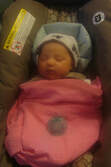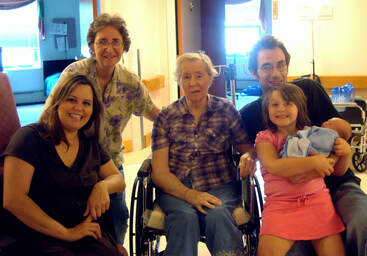|
This is a tough topic to address although they're all tough to a certain degree. I haven't always been successful myself with this delicate dance of grandparenting. As an older adult who has made lots of mistakes and hopefully learned from most of them, I have a lot of advice to give. However, it's not always welcome, and I haven't always recognized that. Parenting is the toughest job there is and often doesn't get its due from non-parents. Grandparenting is supposed to be the easiest and most wonderful follow-up to that, and it usually is. However, it is very hard to watch your adult children make mistakes, especially when they could have been avoided. My rule for myself now is to either wait until asked or ask first if they'd like to know what I think. If they say no, I respect that but might try again later depending on how important I think it is. New parents often feel defensive about their parenting skills. I know I did. We don't know what we're doing and worry that we'll do it all wrong. However, we also need to feel in charge and make our own mistakes. So, how do we find that balance? Elders are an important source of information. We don't have all the answers but we probably have a lot. As for me, I nursed three of my own babies, had hospital births and homebirths, sent my children to public school, private alternative school and homeschooled them. I dealt with food allergies and too many illnesses to name here, including accidents that needed stitches. I learned how to do my own butterflies on wounds when we had no health insurance and studied herbology and natural healing. I made my own babyfood and dealt with sleep issues, discipline and more. My children were all different with their own set of issues, so I've had to learn a lot over the years. When my children were teens and adults, I faced more issues than most people ever have to deal with and know how to navigate multiple "systems." Basically and unfortunately, I am a font of knowledge. That is what the role of elders is supposed to be. We are fonts of knowledge. If one elder doesn't know the answer, another one will, and most of us want to help out. We want to be asked. In previous generations, elders lived with or close by their children giving assistance and guidance. Often the elders raised the kids. Most of us are really good at it and have much more patience. We see things differently as we age. That different perspective is very valuable and, let's face it, we want to feel valued as we age. We're not ready to be thrown out and discounted. Many of us are in the prime of our lives. So let's move on to the parents. As a parent, the last thing we want is to be told we're doing something wrong. We're doing the best we can and are obviously bound to make mistakes. Who wants that shoved in their face? Grandparents need to let parents make those mistakes so that they learn. When they do make those mistakes, it's important that we not say, "I told you so," or "If you'd only listened to me..." What grandparents need to do then is listen and comfort their hurting child. It's not easy to face our mistakes but an important part of the process. If we want our children to come to us in times of stress or times of need, we need to be compassionate and loving even if we would have done things differently. The more supportive we are instead of being critical, the more likely they will come seeking advice when they need it. However, parents do need to remember to ask for help, too. Ultimately, there is no magic answer to any of this. Like I said, parenting is the hardest job, and it doesn't get easier when your children have children of their own. But the best course, in my opinion, is for grandparents to hold their tongue and for parents to seek out their parents' learned knowledge. Although my own mother and I didn't get along well, I often turned to her for parenting advice. We can all work together as a team. It really does take a village to raise a child.
0 Comments
 Everyone who has had a baby knows that sleep is a huge issue. How do we get our babies to get enough sleep, to fall asleep on their own, to not get woken up easily? These are just a few questions that parents have to face with their very young ones. Some folks do a “family bed,” though many experts warn against this. Some people do “sleep training.” Some babies just fall into a routine without much effort on the part of parents. In my opinion, there are no right or wrong ways to help your baby with this issue. It is up to you to decide what works best for you. However, I can share what I did with my own babies. Not every child has the same sleep needs. Some babies will take morning and afternoon naps. Some of them will take only one nap a day and some will take several short catnaps more often. My daughter rarely took naps and had trouble falling asleep at night. Once she fell asleep, she slept well. My first son still took afternoon naps until he was 7 or 8, coming home from school most days and falling asleep on the couch. It’s important that we pay attention to what their sleep needs are and help facilitate their sleep. I believe that we should let them lead us in what they need, within reason of course. I always sang to them before putting them down for bed, whether it was a nap or their regular bedtime. I did this until they were old enough not to be tucked in. When they were little, I rocked them and nursed them before bed, singing while we rocked. As tiny infants, I usually held them until they fell asleep then laid them in their beds. At first, they didn’t want to stay in their beds but wanted to continue being held. I gently patted them, singing while I did until they settled and slept. When my children were little, we put them down on their stomachs. Now, the recommendation is to lay them on their backs, but you can still pat their tummies or chest. Once I thought they were asleep, I stopped patting but continued to sing for a few more minutes getting quieter until I was no longer making a sound. I didn’t like the routine of letting them cry themselves to sleep. I understood the concept of babies learning to self-sooth and agreed with it but chose to go about it in a gentler way. Sometimes, they would fall asleep in the car. In that case, I would carry their car seat inside and let them finish their nap there. If it was a very bright day, I'd throw a light blanket over it to block out the light or put it in a darkened room. I decided not to have a “family bed,” though I have nothing against them, because my husband was such a sound and active sleeper. The other downside for me of a family bed was that I didn’t sleep well enough. I needed to have a good night’s sleep without worrying about the tiny child next to me. We had a partial family bed in that I brought my children into my bed to nurse and snuggle, and they were always welcome in the early morning when I would just doze. My infants were in the same room with us and right next to the bed, so I could reach out and touch them at any time. After all I thought, who ever wants to sleep alone given the choice? After being in the womb, surrounded by warmth and the smell and sound of their mother, it must be very alien, and maybe frightening, to suddenly be all alone. However, I had to deal with practicalities. When they were infants, I wore my babies in packs during the days and sometimes slept with my babies for their naps but found I couldn’t leave them to catch up on chores for fear that they would fall out of the bed, so I often moved them into their own beds once they were asleep or slept on a mat on the floor with them so that I could sneak out without worry. I had just turned 22 when my daughter was born. Her dad and I were musicians, practicing and jamming sometimes late into the night. I knew I needed her to stay asleep in spite of the loud sounds around, so I made lots of noise. I always recommend this to parents who don’t want to have to tiptoe around their babies. I vacuumed in her room while she was sleeping. I dropped heavy things and spoke or sang loudly right next to her as she slept. She learned to block out those sounds and once asleep, slept soundly. I did the same with each of her brothers and with my grandchildren. They could sleep through anything, so I had to train them to wake for certain sounds like smoke alarms. Babies are incredibly resilient. They learn quickly and definitely learn how to manipulate adults when they are very young. Most people don’t give babies enough credit for being as smart as they are. They are like little sponges, learning new things every day, even every hour. But they are also strong and know what they want. The tricky thing is learning to stand your ground without squashing their spirit. Every parent knows instinctively what to do. Follow your heart but be aware that parenting is hard work that requires us to do things in the best interest of our child, and some of those things may not seem as though they are in their best interest at the time when they are crying. And honestly, wouldn’t it be nice if we could all get everything we wanted by just crying? This might be one of the hardest things for me to have learned as a parent. While I was growing up, my parents had very unreasonable expectations for me and my brother - ones that we could never live up to, though I tried hard my whole life and always, until fairly recently, ended up feeling like a failure. That’s what happens when we set the bar too high for our kids. We certainly don’t intend to do that, but our kids want to please us, to make us proud, so they try their hardest to achieve that goal. The flip side of that is not setting the bar high enough. It’s a very tricky balance and one I’ve struggled with as a parent.
Just like with limit setting, we have to constantly assess each situation and be flexible. For me and my brother, we had different abilities and different interests. It would have been unreasonable for my parents to expect my brother to be a great musician or for me to be a great athlete. We each had our own likes and dislikes. I loved music, art and writing. He liked sports. I’m sure some of that was a sign of the times in which we grew up, but probably not all of it. I knew from very early on that I was a musician and hoped to spend my life doing that. I wasn’t encouraged to pursue other interests and wasn’t discouraged from pursuing what I loved, but I was never able to please my parents with what I saw as my own successes. That continued on into my adulthood. They never asked about my music and never came to gigs because it wasn’t the music they liked or wanted me to be playing. It wasn’t until they passed that I heard from their friends and acquaintances, at their respective funerals, that my parents were very proud of me and bragged often, playing tapes and CDs of my music to whoever would listen. Although it was wonderful to hear that they really were proud, it made me very sad that I never knew while they were still alive. Please tell your children about the things you love that they do but be genuine. You are obviously not going to like everything. Just don’t criticize what you don’t like and praise what you do. If they ask you, be honest with them. You can say things like, “I’m not really that fond of …, but you do it well.” Or, “I don’t know much about it, but I’m sure it’s great.” I have given that answer to my children on occasion. We want them to be realistic without discouraging them. I’ve often said, “That was great. I wonder if you could improve it by …” Or, “Have you tried …? That might make it even better.” We all need productive criticism sometimes. Suggestions for improving things are helpful and, if said the right way, they don’t have to be discouraging. I think the most important thing to remember is that we want to be interested in the things our children are doing, regardless of how we feel about them, but we want to retain our critical eye, too. They depend on our input. Sometimes we are afraid to tell the truth for fear of hurting them. It’s all in the way we approach it. In my song circle, I always encourage people to express the things they like before launching into their critique. Remember, honesty is the best policy, but always approach it gently. I'm writing this a little late, but life gets complicated sometimes, and I have to just go with the flow. We've just entered 2019 and started a new year, whatever that really means. Our young children can't possibly understand the passing of time fully. They just know that everyone says things like, "See you next year," or "Happy New Year!" It's like birthdays. Who ever feels older on their birthday, except conceptually? Time keeping has always baffled me. A friend was once given a watch with "NOW" written instead of each number. Now that's my kind of watch. However, I do the idea of starting anew with plans and schemes for how I would like my life to go in the coming year.
I've always been a fan of tradition. On Thanksgiving, much to my family's chagrin, I always ask what everyone is thankful for and insist that everyone answer. This Winter Solstice, I asked everyone to share a story. Not everyone did, and I didn't insist since it was a new thing, but they'd better be prepared next year. As much as they all complain, they also enjoy it. On New Year's Eve, we celebrate at midnight, but not every child will stay up that late. Why not have your celebration early. Celebrate the new year of a different time zone. Who will really know the difference? You could even find out what the traditions are for that time zone. I like to think about the things I'm leaving behind from the ending year on New Year's Eve. I think about the difficult things and try to let them go. I believe it's a good way to acknowlege hard times with your children without dwelling on them and giving them permission to move on to happier things. On New Year's Day, I like to plan to do all of the things I want to do in the coming year. This year, I did a little cleaning (because I really don't want to spend my whole year doing that but do want a clean space), practiced my music, wrote a new song, cooked a nice meal, spent time with my partner and went for a walk, visiting our lovely neighbors along the way. I also reached out to my family members in some way or other. It's not too late to do that with your children. Why does it have to be on January 1st? It can happen anytime in the beginning of January. Just encourage them to think about how they would their year to go and ask them to intentionally do those things at this beginning of the year. Because I love tradition so much, I researched New Year traditions from around the world. Noise making was done in many cultures to drive away evil spirits. Many cultures have special foods that they eat on New Year's Eve and New Year's Day. I made Scotch Shortbread this year to honor the people who were more like grandparents to me as a child than my own because they lived so closeby. Drinking is a common theme, and most of the drinks are spiced and warm. In Rome, Persia, early Egypt and in Scotland, gifts are given on New Year's Day. Some adages and sayings associated with the New Year are: * On New Year’s Eve, kiss the person you hope to keep kissing. * If New Year’s Eve night wind blow south, It betokeneth warmth and growth. * For abundance in the new year, fill your pockets and cupboards today. * If the old year goes out like a lion, the new year will come in like a lamb. * Begin the new year square with every man. [i.e., pay your debts!] –Robert B. Thomas, founder of The Old Farmer’s Almanac Notice that a lot of these saying are about starting the year off on the right foot. The Scottish have a tradition called "First Footing." Have you thought about any behavior changes you would like your children to make? This is perfect time to talk about those things while letting them know about the changes you plan to make as well. And, do they have any request of you? We can all build our own traditions from scratch or based on older traditions. They don't have to be from our own culture, but I think acknowledging our heritage and keeping those traditions alive is always a good thing. Whatever you decide to do, be sure to include your family in the planning. Then everyone feels as though they can own it. My traditions nearly always involve music of some kind because that's more important to me than specific food or drink. Some cultures leave a basket of things outside on New Year's Eve and bring it in on New Year's Day. The basket is filled with things you want to have during the year. What would you put in your basket? I hope 2019 brings lots of happiness, health and laughter to all of you and your families. |
Archives
April 2019
Categories |




 RSS Feed
RSS Feed